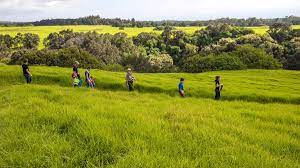Nature has long been hailed for its soothing and rejuvenating effects on the human spirit. This article delves into the concept of nature therapy, shedding light on its benefits, underlying science, and how it offers a holistic approach to healing.

The Call of the Outdoors
In a world marked by constant connectivity and urbanization, nature therapy serves as a reminder of our intrinsic connection to the natural world. It beckons individuals to step outside and rekindle a relationship that spans millennia.
The Science of Biophilia
Biophilia, the innate human affinity for nature, underpins the effectiveness of nature therapy. Research shows that exposure to natural environments can reduce stress, lower blood pressure, and improve mental well-being.
Shinrin-Yoku: The Art of Forest Bathing
Originating in Japan, shinrin-yoku, or forest bathing, is a cornerstone of nature therapy. It involves immersing oneself in the forest, embracing its sights, sounds, and aromas to promote relaxation and tranquility.
Stress Reduction and Mindfulness
Nature therapy acts as a natural stress buster. The mere act of being in nature triggers the parasympathetic nervous system, inducing relaxation and enabling mindfulness.
Boosting Immunity and Vitality
Time in nature has been linked to improved immune function. Phytoncides, natural compounds emitted by trees, have been shown to enhance immune activity, offering a boost to overall health.
Elevating Mood and Mental Health
Nature therapy is a mood enhancer. Exposure to natural surroundings increases the production of serotonin, the “feel-good” neurotransmitter, while reducing symptoms of anxiety and depression.
Reconnecting with the Senses
In urban settings, our senses often remain dulled. Nature therapy awakens the senses—birdsong, rustling leaves, the scent of wildflowers—inviting us to experience life more vividly.
Cultivating Mindfulness in Nature
Nature naturally fosters mindfulness. It encourages us to be present, to observe without judgment, and to fully engage with the beauty and rhythm of the environment.
Embracing Digital Detox
Nature therapy promotes disconnecting from screens and connecting with the natural world. It offers respite from the constant barrage of notifications and digital distractions.
Healing Through Ecotherapy
Ecotherapy, a subset of nature therapy, employs natural settings as therapeutic spaces. It encompasses practices like wilderness therapy, horticultural therapy, and even animal-assisted therapy.
Restoring the Balance
Nature therapy addresses “nature deficit disorder,” a term coined to describe the disconnect from nature that modern lifestyles have fostered. It aims to restore the equilibrium between human and natural worlds.
Accessible to All
Natural therapy is inclusive. It doesn’t require an expansive forest; a neighborhood park, a garden, or even a potted plant can provide the therapeutic benefits of nature.
Cultivating Connection and Empathy
Time in nature fosters a sense of interconnectedness. It encourages empathy toward the environment, promoting a desire to protect and preserve it for future generations.
Nature as a Source of Wisdom
Nature therapy draws from indigenous wisdom that recognizes the symbiotic relationship between humans and the environment. It honors the teachings of cultures that have revered the land for centuries.
A Prescription for Well-being
In summary, natural therapy is more than a leisurely walk in the woods; it’s a prescription for holistic well-being. It’s a testament to the healing power of the natural world, offering solace, inspiration, and a profound sense of unity with the Earth. As we navigate the demands of modern life, nature therapy stands as a gentle reminder that the remedy to many of our ailments lies just beyond our doorstep, waiting to embrace us with its wisdom and grace.

